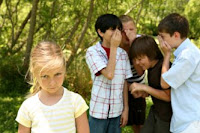Autistic Kids and Peer Rejection
“I need to help my autistic daughter (high functioning) deal with peers – and rejection of peers. I want to be able to help her fit in with her friends.”
 All kids want friends. Friendships are what make children who they are developmentally, emotionally, and intellectually. It starts when children are just babies.
All kids want friends. Friendships are what make children who they are developmentally, emotionally, and intellectually. It starts when children are just babies.
 All kids want friends. Friendships are what make children who they are developmentally, emotionally, and intellectually. It starts when children are just babies.
All kids want friends. Friendships are what make children who they are developmentally, emotionally, and intellectually. It starts when children are just babies. Moms and dads sit mesmerized, waiting for their son or daughter to make eye contact, smile, and coo. It’s the beginning of real, social connection. From that moment, life is all about relationship.
Younger kids spend most of their time trying to make and keep friends. The early years of school continue to focus primarily on friendships, emphasizing socialization over academics. But, kids with ASD level 1, or High-Functioning Autism (HFA), have genuine struggles making friends and keeping them. This sets the stage for most of the obvious problems related to autism spectrum disorders.
Your daughter should know that you are an available support for her when things happen that are beyond her control. Young people with HFA need structured, step-by-step guidelines to help them in sticky situations. You can set up a plan for her to use when dealing with her peers.
Use your daughter’s specific friendships to draw out your guidelines. If she has a friend who is happy to play, but acts differently when others are around, she needs a plan of action on how to handle the situation. This can be typical behavior for boys and girls when they fall into social cliques. Help her make a list of “if-then” steps to follow. For example:
Younger kids spend most of their time trying to make and keep friends. The early years of school continue to focus primarily on friendships, emphasizing socialization over academics. But, kids with ASD level 1, or High-Functioning Autism (HFA), have genuine struggles making friends and keeping them. This sets the stage for most of the obvious problems related to autism spectrum disorders.
Your daughter should know that you are an available support for her when things happen that are beyond her control. Young people with HFA need structured, step-by-step guidelines to help them in sticky situations. You can set up a plan for her to use when dealing with her peers.
Use your daughter’s specific friendships to draw out your guidelines. If she has a friend who is happy to play, but acts differently when others are around, she needs a plan of action on how to handle the situation. This can be typical behavior for boys and girls when they fall into social cliques. Help her make a list of “if-then” steps to follow. For example:
- If my friend acts like she doesn’t know me, then I will tell her I don’t like how she is treating me.
- If my friend calls me names in front of other kids, then I will play with someone else or tell an adult.
- If my friend is happy to play, then we’ll play together on the swings.
Another example could be time on the playground. Lay out the guidelines of acceptable behavior on the playground. Give your daughter examples of problems that may arise, and write out a plan of action on how to deal with these problems. With practice, your daughter will be able to replay her plan in her mind and put it into action. For example:
- If my peers try to skip my turn on the slide, I will calmly tell them it is my turn.
- If a boy or girl bullies me on the playground, I will tell my teacher as soon as possible.
- If my teacher doesn’t help me with a bully on the playground, I will tell another grown-up that I trust as soon as I can.
Rejection is tough for all children. There will be times when your daughter will be rejected. It may be that her spectrum disorder has little to do with the rejection. You can still have a plan for dealing with rejection. She should know what appropriate behavior is for a child who has been rejected. Reassure her that this is normal, and that all kids get rejected at some point.
Resources for parents of children and teens on the autism spectrum:
==> How to Prevent Meltdowns and Tantrums in Children with Autism Spectrum Disorder
==> Parenting System that Reduces Defiant Behavior in Teens with Autism Spectrum Disorder
==> Launching Adult Children with Autism Spectrum Disorder: Guide for Parents Who Want to Promote Self-Reliance
==> Teaching Social-Skills and Emotion-Management to Children with Autism Spectrum Disorder
==> Parenting Children and Teens with High-Functioning Autism: Parents' Comprehensive Handbook
==> Unraveling the Mystery Behind High-Functioning Autism: Audio Book
==> Crucial Research-Based Parenting Strategies for Children and Teens with High-Functioning Autism
==> Parenting System that Reduces Defiant Behavior in Teens with Autism Spectrum Disorder
==> Launching Adult Children with Autism Spectrum Disorder: Guide for Parents Who Want to Promote Self-Reliance
==> Teaching Social-Skills and Emotion-Management to Children with Autism Spectrum Disorder
==> Parenting Children and Teens with High-Functioning Autism: Parents' Comprehensive Handbook
==> Unraveling the Mystery Behind High-Functioning Autism: Audio Book
==> Crucial Research-Based Parenting Strategies for Children and Teens with High-Functioning Autism
----------
Resources for Neurodiverse Couples:
==> Online Group Therapy for Men with ASD
==> Online Group Therapy for NT Wives
==> Living with ASD: eBook and Audio Instruction for Neurodiverse Couples
==> One-on-One Counseling for Struggling Individuals & Couples Affected by ASD
==> Online Group Therapy for Couples Affected by Autism Spectrum Disorder
==> Cassandra Syndrome Recovery for NT Wives
==> ASD Men's MasterClass: Social-Skills Training and Emotional-Literacy Development
==> Pressed for time? Watch these "less-than-one-minute" videos for on the go.
COMMENTS:
• Anonymous said… AS AN ADULT IM STILL STRUGGLING WITH THE REJECTION FROM FRIENDS AND THE REJECTION MY SONS RECIEVE ITS HEART BREAKING ALL YOU CAN DO IS BE THERE FOR THEM WHEN IT HAPPENS. I FOUND STICKING TO OUR OWN KIND WORKS FIND THE SIMALARITIES AND STICK WITH THAT.
• Anonymous said… My son with through the same thing in middle school. He looks normal, but when they found out he was in a special class they stopped hanging around with him- Maybe your women friends has kids you know that he can play with.
• Anonymous said… My son is fifteen i give up trying and now he has made other aspie friends that understand him.
• Anonymous said… Find a support group etc its amazing hoq many friends u find for u and ur child. All the best xoxo
* Anonymous said... my 14 year old daughter is really struggling as we'll. as I am a Christian, I have been encouraging her to join the youth meetings at church.
Please post your comment below…
• Anonymous said… AS AN ADULT IM STILL STRUGGLING WITH THE REJECTION FROM FRIENDS AND THE REJECTION MY SONS RECIEVE ITS HEART BREAKING ALL YOU CAN DO IS BE THERE FOR THEM WHEN IT HAPPENS. I FOUND STICKING TO OUR OWN KIND WORKS FIND THE SIMALARITIES AND STICK WITH THAT.
• Anonymous said… My son with through the same thing in middle school. He looks normal, but when they found out he was in a special class they stopped hanging around with him- Maybe your women friends has kids you know that he can play with.
• Anonymous said… My son is fifteen i give up trying and now he has made other aspie friends that understand him.
• Anonymous said… Find a support group etc its amazing hoq many friends u find for u and ur child. All the best xoxo
* Anonymous said... my 14 year old daughter is really struggling as we'll. as I am a Christian, I have been encouraging her to join the youth meetings at church.
Please post your comment below…




